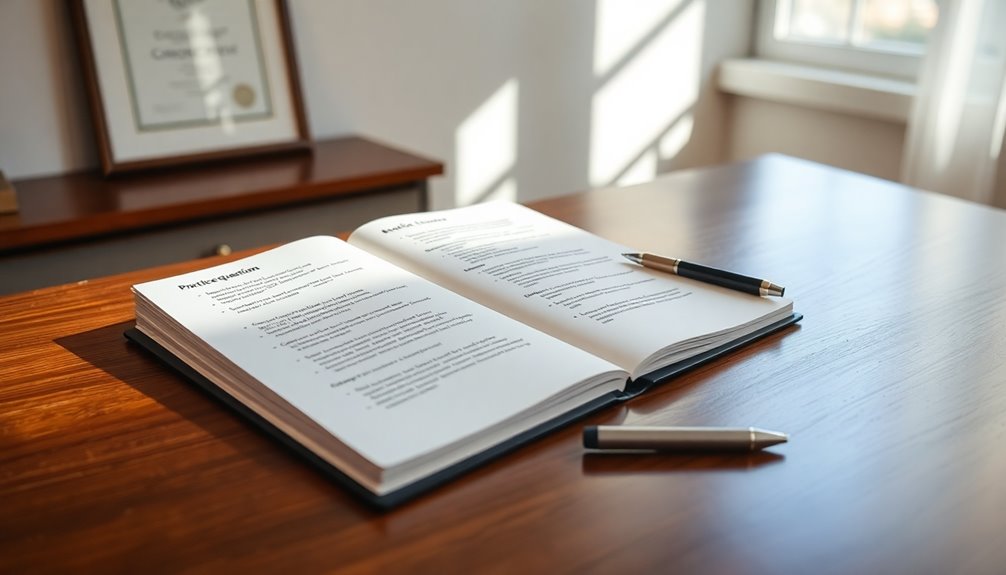Nailing your job interview with written tests means you need to be prepared and focused. These tests offer objective insights into your skills and knowledge relevant to the position. Different types assess various abilities, from communication to problem-solving. To succeed, practice with sample tests and familiarize yourself with the specific formats. Pay close attention to instructions and check for mistakes, as detail matters. Staying calm and managing your time effectively is essential, too. Prepare well, and you'll increase your chances of leaving a lasting impression on employers, leading to further opportunities. There's much more to explore on this topic.
Key Takeaways
- Prepare for written tests by researching the job role and practicing with sample tests to build confidence and familiarity.
- Focus on clear communication and logical structure in writing tasks to effectively demonstrate your skills.
- Pay close attention to instructions and guidelines to minimize errors and showcase your attention to detail.
- Practice time management during mock tests to enhance your performance under real test conditions.
- Seek clarification on any uncertainties during the test to ensure you accurately address the tasks assigned.
Importance of Written Tests

Why are written tests such an essential part of the job interview process? They provide a clear, objective way to evaluate your skills and knowledge relevant to the position.
Unlike verbal assessments, written tests can measure your abilities in a structured format, allowing employers to compare candidates fairly. They help hiring managers identify your strengths and weaknesses, ensuring you fit the role.
Written tests also illustrate how well you can communicate ideas, solve problems, and think critically under pressure. By demonstrating your skills on paper, you enhance your credibility and show your potential value to the organization. Additionally, excelling in written tests can reflect your strong communication skills, which are crucial for building rapport with future team members.
Ultimately, performing well on these tests can greatly boost your chances of landing that job you desire.
Types of Written Tests

Written tests come in various forms, each designed to evaluate specific skills and competencies relevant to the job you're applying for.
You might encounter communication tests that assess your ability to articulate ideas clearly in writing, or aptitude tests that measure your reasoning and problem-solving skills.
Intelligence tests could evaluate your logical thinking abilities, while personality assessments may reveal traits important for teamwork and stress management.
Additionally, you may face problem-solving tests that challenge you with job-related scenarios. Understanding the importance of personality assessments can provide insights into how your traits align with the job requirements.
The type of written test you'll take depends on the job requirements and the employer's preferences, so understanding these diverse formats can help you prepare effectively and showcase your strengths during the interview process.
Communication Skills Assessment

When you're preparing for a job interview, a communication skills assessment can be a key component of the evaluation process. This test typically involves writing tasks like letters or essays, designed to evaluate your ability to convey information clearly and effectively.
Employers look for clarity of thought, proper grammar, and relevance of content. To excel, focus on structuring your ideas logically and using concise language. Practice writing under timed conditions to get comfortable with the format.
Additionally, review sample prompts to familiarize yourself with potential topics. Remember, this assessment not only showcases your technical writing skills but also reflects your overall communication abilities, which are essential in many job roles.
Understanding Aptitude Tests

Aptitude tests are often a significant part of the interview process, evaluating your skills and abilities in relation to the job requirements. These tests typically assess areas like reasoning, numerical ability, and verbal skills, helping employers gauge your potential for success in the role.
| Test Type | Focus Area |
|---|---|
| Numerical Ability | Math, data interpretation |
| Verbal Reasoning | Reading comprehension, logic |
| Abstract Reasoning | Pattern recognition |
| Spatial Awareness | Visualizing and manipulating objects |
Preparing for these tests can enhance your performance. Familiarizing yourself with the test format and practicing sample questions will boost your confidence and ability to showcase your strengths effectively. Remember, these assessments are just one part of the overall evaluation process.
Personality and Problem-Solving Evaluation

Personality and problem-solving evaluations play an essential role in evaluating how well candidates fit into a company's culture and handle job-related challenges.
These tests typically consist of multiple-choice or short-answer questions designed to assess your character traits and soft skills, such as teamwork and stress management.
You'll also encounter problem-solving scenarios that gauge your ability to tackle job-related issues effectively.
Test Preparation Techniques

Effective test preparation techniques can considerably enhance your performance during job interviews. Start by researching the job role and industry standards. Practice with sample tests available online to familiarize yourself with question formats. Gather all necessary materials—pens, paper, and calculators—before the test day. Make sure you get a good night's sleep and arrive early to settle in. Additionally, consider the impact of quality content creation on your overall presentation, as strong communication skills can set you apart from other candidates.
Here's a quick overview of essential preparation strategies:
| Strategy | Description |
|---|---|
| Research | Understand job requirements and industry trends. |
| Practice | Take sample tests to build confidence and familiarity. |
| Organize Materials | Collect necessary tools to avoid last-minute stress. |
Effective Time Management

Time management plays an essential role in your success during written tests in job interviews. To maximize your performance, allocate time wisely across different sections.
Start by quickly reading through the entire test, noting the number of questions and the time limit. This helps you gauge how much time you can spend on each question.
Prioritize sections based on your strengths and familiarity; tackle easier questions first to build confidence. Regularly check the clock to stay on track, and adjust your pace if necessary.
If you're stuck on a question, move on and return later if time allows. By managing your time effectively, you'll increase your chances of completing the test and showcasing your abilities. Additionally, using daily goal tracking can help you stay focused and organized during preparation for the test.
Error Checking Strategies

Proofreading your responses is essential for making a strong impression during written tests. To catch errors effectively, employ the following strategies:
| Strategy | Description | Benefits |
|---|---|---|
| Reserve Time | Set aside a few minutes at the end | Guarantees thorough review |
| Use Writing Tools | Utilize apps or tools for error detection | Enhances accuracy and efficiency |
| Read Aloud | Vocalize your answers | Helps identify overlooked mistakes |
| Focus on Common Errors | Target frequent issues like grammar | Increases clarity and coherence |
Staying Calm During Tests

Staying calm during tests is essential for performing at your best and making a positive impression. When anxiety creeps in, focus on your breathing. Take deep, steady breaths to center yourself; it helps clear your mind.
Remind yourself that you've prepared, and trust in your abilities. Visualize success—imagine yourself completing the test confidently and accurately. It's also helpful to adopt a positive mindset; use affirmations to reinforce your self-assurance.
If you feel overwhelmed, take a moment to pause and gather your thoughts. Remember, a little stress is normal, but managing it effectively can make all the difference.
Following Instructions Carefully

Following instructions carefully is essential for success in any job interview, especially during written tests. When you receive the test, read the instructions thoroughly before diving in. This guarantees you understand the format, time limits, and specific requirements.
If something isn't clear, don't hesitate to ask for clarification. It's better to address uncertainties upfront than to make avoidable mistakes later. As you work through the test, keep checking back to the instructions to guarantee you're on track.
Following guidelines closely not only helps you avoid errors but also demonstrates your attention to detail—a quality most employers value. Ultimately, adhering to instructions can set you apart and enhance your chances of landing the job.
Frequently Asked Questions
How Can I Stand Out in Written Tests?
To stand out in written tests, you need to prepare thoroughly. Research the role and review relevant materials.
Practice with sample questions to enhance your skills. During the test, manage your time wisely, prioritizing sections based on difficulty.
Make sure to read instructions carefully and take notes if allowed. After completing, reserve time for proofreading your work to catch any errors.
Finally, stay calm and confident; your attitude can make a difference!
What Should I Do if I Run Out of Time?
Did you know that 70% of test-takers worry about time management?
If you run out of time, don't panic! Quickly prioritize the questions you've answered, and if possible, jot down key points for the unanswered ones.
Focus on what you can complete rather than stressing about what's left. If there's time at the end, review your work for any mistakes.
Are There Specific Topics to Review Before the Test?
Before your test, focus on reviewing key topics relevant to the role.
Look into the job description to identify necessary skills and knowledge areas. Familiarize yourself with common test formats and practice sample questions.
You should also brush up on industry-specific knowledge and any tools or software mentioned in the job listing.
This preparation will boost your confidence and help you perform better during the test.
Don't forget to relax and stay positive!
How Can I Practice Writing Under Time Constraints?
Practicing writing under time constraints can feel like trying to sprint a marathon!
To get started, set a timer for 15-30 minutes and choose a topic. Write continuously, focusing on ideas rather than perfection. Use prompts or past test questions for variety.
Afterward, review your work for clarity and coherence. Gradually decrease the time limit as you improve, and don't forget to celebrate small victories along the way!
What if I Feel Unprepared for the Written Test?
If you feel unprepared for the written test, take a deep breath and focus on what you can control.
Review the job requirements and study related topics. Practice with sample questions to boost your confidence.
Remember, it's normal to feel anxious, so visualize success and remind yourself of your strengths.
Arriving early to familiarize yourself with the environment can also help calm your nerves and improve your focus during the test.
Conclusion
To sum up, acing written tests is essential for standing out in your job interview. Remember, "the devil is in the details," so pay close attention to instructions and manage your time wisely. With practice and a calm mindset, you can showcase your skills effectively. Embrace these assessments as opportunities to demonstrate your adaptability and critical thinking. By preparing thoroughly, you'll walk into that interview with confidence and leave a lasting impression on your potential employer.









